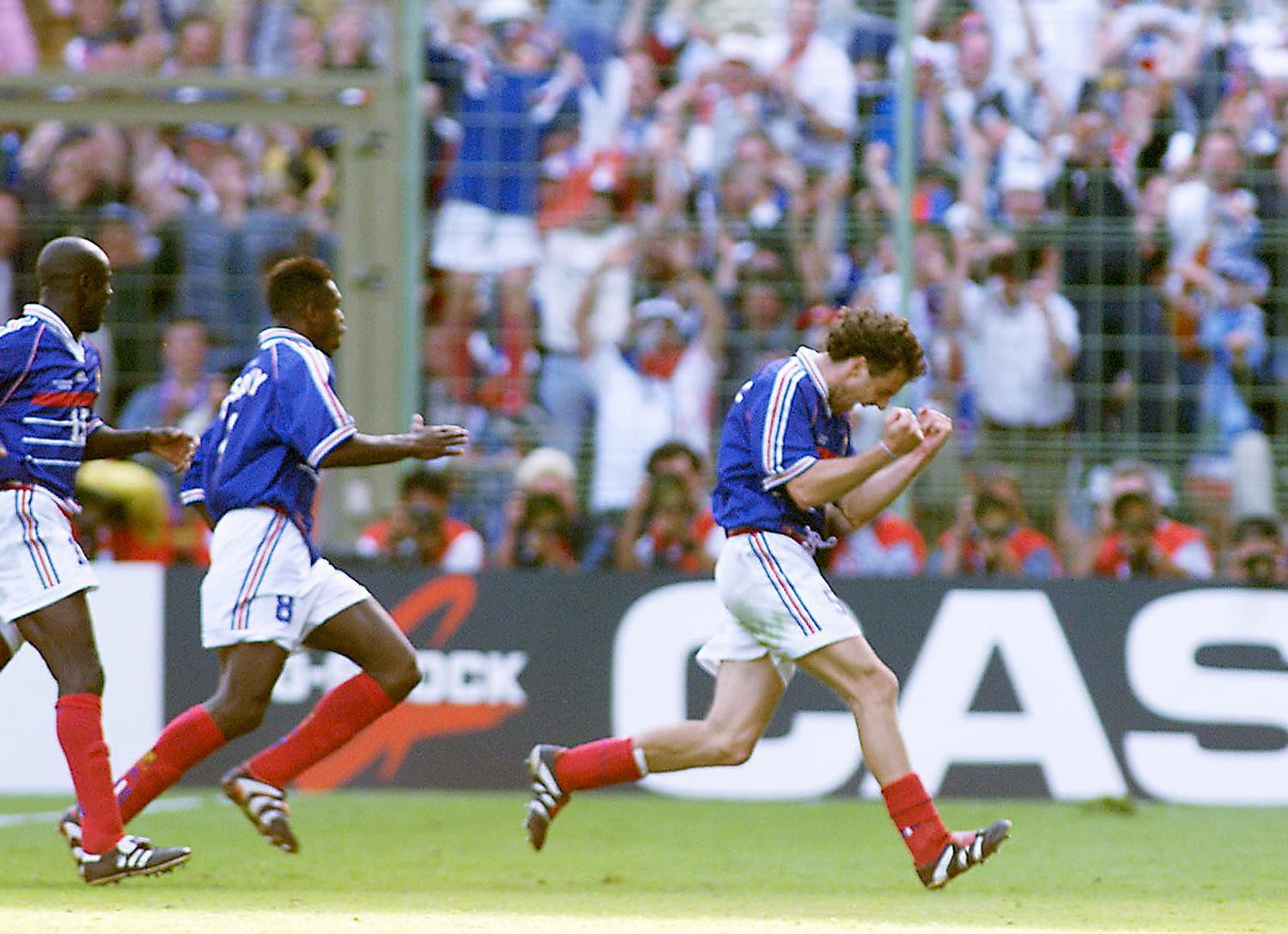Answering the question, “What Is The Golden Goal In Football?,” this article dives deep into its history, impact, and eventual abolishment, while also providing valuable context for US soccer fans. CAUHOI2025.UK.COM delivers easy-to-understand explanations, ensuring you grasp the nuances of this once-controversial rule and how it shaped the sport. Discover the golden goal’s legacy and its influence on modern soccer strategies and regulations.
1. Understanding the Golden Goal Rule in Soccer
The golden goal in football, also known as “sudden death,” was a rule stipulating that the first goal scored during extra time would immediately win the match. Introduced by FIFA in the 1990s, it aimed to encourage attacking play and resolve drawn matches quickly. While initially lauded for its potential excitement, the golden goal rule ultimately faced criticism and was eventually abolished.
1.1. How the Golden Goal Worked
The concept of the golden goal was straightforward: if a match was tied after regulation time, extra time would commence. The first team to score in extra time would be declared the winner, and the game would immediately end. This eliminated the need to play the remainder of extra time, creating a sense of urgency and high stakes.
1.2. The Intention Behind the Rule
FIFA introduced the golden goal with the intention of promoting attacking football during extra time. The belief was that teams would be more inclined to take risks and push forward in search of a decisive goal, leading to more exciting and decisive matches. This approach was also seen as a way to reduce the likelihood of penalty shootouts, which were often viewed as a less satisfactory way to determine a winner.
2. History of the Golden Goal
The golden goal rule has a history that reflects its controversial nature. It was initially introduced as an experiment to encourage more attacking play in extra time but faced significant challenges and was ultimately replaced with different approaches.
2.1. Introduction and Early Use
FIFA first trialed the golden goal system in youth matches as early as 1993 before its introduction to senior international competitions. It gained prominence at events like the Olympics and the Confederations Cup. One of its high-profile early uses was during the Euro 1996 final, where Oliver Bierhoff’s golden goal secured victory for Germany against the Czech Republic.
2.2. Prominent Tournaments Featuring Golden Goal
The golden goal rule featured in several major international tournaments, including the 1998 and 2002 World Cups, as well as the 1996 and 2000 European Championships. These tournaments provided a significant platform for the rule, showcasing its impact on high-stakes matches.
- 1998 World Cup: Laurent Blanc scored the first-ever World Cup golden goal for France in their last-16 match against Paraguay.
- Euro 2000: David Trezeguet scored a golden goal for France against Italy in the final.
- 2002 World Cup: Three golden goals were scored, with Senegal and South Korea benefiting in the Round of 16.
 Laurent Blanc celebrates the World Cup's first ever Golden Goal
Laurent Blanc celebrates the World Cup's first ever Golden Goal
2.3. The Downfall: Criticisms and Abolishment
Despite its initial promise, the golden goal rule faced increasing criticism over time. Teams often adopted a more defensive approach in extra time, prioritizing avoiding conceding a goal rather than actively seeking to score. This resulted in slower, more cautious play, contrary to the rule’s original intent. By 2004, both the golden goal and its alternative, the silver goal, were scrapped by FIFA.
3. Why the Golden Goal Was Abolished
The golden goal rule, despite its intent to create more exciting and decisive matches, faced several critical issues that led to its abolishment. These issues ranged from tactical impacts to concerns about fairness and player welfare.
3.1. Defensive Tactics and Negative Impact on Play
One of the primary reasons for the golden goal’s abolishment was its tendency to encourage defensive tactics. Instead of promoting attacking play, teams often became more cautious and focused on not conceding, leading to dull and uneventful extra-time periods.
3.2. Unfairness and Psychological Impact
Critics argued that deciding a match based on a single goal in extra time was unfair, as it placed undue emphasis on a single moment. The psychological pressure on players to avoid mistakes was immense, often leading to overly cautious play.
3.3. Alternatives: Silver Goal and Return to Traditional Extra Time
FIFA attempted to address the shortcomings of the golden goal by introducing the silver goal in 2003. Under this rule, the team leading after the first half of extra time would win the match. However, the silver goal also failed to gain widespread acceptance and was eventually abandoned along with the golden goal. Following Euro 2004, FIFA reverted to the traditional extra time format, where the full 30 minutes are played, followed by penalties if the score remains level.
4. Current Extra Time Rules in Football
The abolishment of the golden goal and silver goal rules led to the re-establishment of traditional extra time and penalty shootouts as the standard methods for resolving drawn matches. These rules are now universally applied in professional football.
4.1. Standard Extra Time Format
Under the current rules, if a match is tied after 90 minutes of regulation time, two 15-minute halves of extra time are played. The full 30 minutes are always played, regardless of whether a goal is scored. This format allows teams more time to strategize and potentially score without the pressure of “sudden death.”
4.2. Penalty Shootouts
If the score remains level after extra time, a penalty shootout determines the winner. Each team takes turns shooting penalties until one team has more successful penalties than the other. The specific rules of penalty shootouts, such as the order of shooters and sudden death scenarios, are governed by FIFA regulations.
4.3. Advantages and Disadvantages of Current Rules
The current extra time rules have their own set of advantages and disadvantages.
- Advantages:
- Provides a more balanced opportunity for both teams to score.
- Reduces the pressure of a single moment deciding the match.
- Allows for more strategic play over a longer period.
- Disadvantages:
- Extra time can be physically demanding on players.
- Penalty shootouts are often seen as a less satisfying way to determine a winner.
- Matches can still end in draws, leading to perceived anticlimactic finishes.
5. Impact on Modern Soccer Strategies
The golden goal era, though relatively short-lived, had a noticeable impact on soccer strategies. Teams adapted their tactics to either exploit or defend against the “sudden death” scenario, influencing how coaches approached extra time.
5.1. Tactical Adjustments During the Golden Goal Era
During the golden goal era, teams often made specific tactical adjustments when entering extra time. These adjustments included:
- Defensive Reinforcements: Bringing on defensive players to protect the score.
- Cautious Play: Avoiding risky plays that could lead to turnovers and scoring opportunities for the opposition.
- Emphasis on Set Pieces: Focusing on set pieces as a less risky way to score.
5.2. Long-Term Effects on Coaching and Player Development
Although the golden goal rule is no longer in effect, its legacy can still be seen in modern soccer. Coaches emphasize the importance of maintaining defensive discipline and avoiding mistakes, particularly in high-pressure situations. Player development also focuses on tactical awareness and the ability to adapt to different game scenarios.
5.3. How the Game Has Evolved Since the Abolishment
Since the abolishment of the golden goal, soccer has continued to evolve, with a greater emphasis on attacking play and tactical flexibility. Teams are now more willing to take risks and push forward in search of goals, leading to more exciting and unpredictable matches. The focus has shifted towards creating multiple scoring opportunities and maintaining possession, rather than simply avoiding mistakes.
6. Golden Goal Moments in History
Despite its controversial nature and eventual abolishment, the golden goal rule produced some unforgettable moments in soccer history. These instances are etched in the memories of fans and continue to be discussed and celebrated.
6.1. Memorable Golden Goals in Major Tournaments
Several golden goals stand out for their drama and significance:
- Oliver Bierhoff’s Golden Goal (Euro 1996 Final): Bierhoff’s goal for Germany against the Czech Republic sealed the victory in the Euro 1996 final.
- Laurent Blanc’s Golden Goal (1998 World Cup): Blanc’s dramatic winner against Paraguay sent France into the quarter-finals.
- David Trezeguet’s Golden Goal (Euro 2000 Final): Trezeguet’s extra-time goal secured the Euro 2000 title for France against Italy.
- Ahn Jung-Hwan’s Golden Goal (2002 World Cup): Ahn’s goal eliminated Italy from the 2002 World Cup, sparking celebrations in South Korea.
- Ilhan Mansiz’s Golden Goal (2002 World Cup): Ilhan’s goal secured Turkey’s place in the semi-finals of the 2002 World Cup.
6.2. The Impact of These Goals on Teams and Fans
These golden goals had a profound impact on the teams and fans involved. They created moments of intense joy and heartbreak, shaping the narratives of tournaments and solidifying the legacies of players and teams.
6.3. How These Moments Are Remembered Today
Today, these golden goal moments are remembered as iconic instances of drama and excitement. They are frequently replayed and discussed, reminding fans of the unpredictable nature of soccer and the impact of a single goal.
7. Understanding Search Intent and User Needs
To effectively address user queries, it’s essential to understand the various search intents related to “what is the golden goal in football.” Identifying these intents allows us to tailor content that meets specific user needs and provides comprehensive information.
7.1. Identified Search Intents
- Informational: Users seeking a definition and explanation of the golden goal rule.
- Historical: Users interested in the history, evolution, and abolishment of the rule.
- Comparative: Users comparing the golden goal rule with current extra time rules.
- Impact Analysis: Users exploring the tactical and strategic effects of the golden goal.
- Anecdotal: Users looking for memorable golden goal moments and stories.
7.2. Addressing User Questions and Concerns
By addressing these search intents, we can create content that answers the following user questions and concerns:
- What exactly was the golden goal rule in soccer?
- When and why was the golden goal rule abolished?
- How did the golden goal rule affect team strategies and tactics?
- What are some memorable golden goal moments in soccer history?
- How do current extra time rules compare to the golden goal rule?
7.3. Providing Value to the Reader
Ultimately, the goal is to provide value to the reader by offering clear, concise, and comprehensive information. By addressing their questions and concerns, we can ensure they leave with a better understanding of the golden goal rule and its place in soccer history.
8. Golden Goal vs. Other Rules
The golden goal rule stands in contrast to other methods of resolving drawn soccer matches. By comparing it with alternative rules, we can better appreciate its unique features and shortcomings.
8.1. Golden Goal vs. Silver Goal
The silver goal, introduced as an alternative to the golden goal, stipulated that the team leading after the first half of extra time would win the match. While intended to address some of the issues with the golden goal, the silver goal also faced criticism and was eventually scrapped.
8.2. Golden Goal vs. Penalty Shootouts
Penalty shootouts are the standard method for resolving drawn matches after extra time. While penalty shootouts can be exciting, they are often seen as a less satisfactory way to determine a winner compared to scoring in open play.
8.3. Pros and Cons of Each Rule
| Rule | Pros | Cons |
|---|---|---|
| Golden Goal | Creates urgency, promotes attacking play | Encourages defensive tactics, can be seen as unfair |
| Silver Goal | Lessens “sudden death” pressure, provides more time to react | Still affects tactics, not widely accepted |
| Penalty Shootout | Decisive, tests composure and skill | Can be seen as random, does not always reflect team performance |
9. Why Choose CAUHOI2025.UK.COM for Soccer Information?
CAUHOI2025.UK.COM is your go-to source for reliable and easy-to-understand explanations of complex topics like the golden goal in football. We provide thoroughly researched content tailored to meet the needs of US audiences, ensuring you get accurate and relevant information.
9.1. Comprehensive and Reliable Information
Our articles are meticulously researched and fact-checked to ensure accuracy and reliability. We draw on reputable sources and expert analysis to provide you with the most up-to-date information.
9.2. User-Friendly Explanations
We understand that not everyone is a soccer expert. That’s why we present information in a clear, concise, and user-friendly manner, avoiding jargon and technical terms whenever possible.
9.3. Tailored for the US Audience
We tailor our content to the interests and knowledge levels of US audiences, providing context and relevance that you won’t find elsewhere. Whether you’re a casual fan or a seasoned enthusiast, CAUHOI2025.UK.COM has something for you.
10. Key Takeaways
- The golden goal was a rule in soccer where the first goal scored in extra time won the match.
- It was introduced by FIFA in the 1990s to encourage attacking play.
- Despite its intentions, it often led to defensive tactics and cautious play.
- The golden goal was abolished in 2004 and replaced with the traditional extra time format.
- Memorable golden goal moments include those scored in major tournaments like the World Cup and European Championships.
- CAUHOI2025.UK.COM provides comprehensive and user-friendly information on soccer and other topics.
11. Frequently Asked Questions (FAQ)
11.1. What was the golden goal rule in soccer?
The golden goal rule stated that the first goal scored during extra time in a soccer match would immediately end the game, declaring the scoring team as the winner.
11.2. Why was the golden goal abolished?
The golden goal was abolished because it often led to defensive tactics and was considered unfair by some, as a single goal could decide the entire match.
11.3. When was the golden goal rule in effect?
The golden goal rule was primarily used in the late 1990s and early 2000s, before being abolished by FIFA in 2004.
11.4. What is the current extra time format in soccer?
The current extra time format consists of two 15-minute halves. If the score remains tied after extra time, a penalty shootout determines the winner.
11.5. How did the golden goal affect soccer strategies?
The golden goal often led teams to adopt more defensive strategies, prioritizing not conceding a goal over attacking.
11.6. Was the golden goal used in the World Cup?
Yes, the golden goal was used in the 1998 and 2002 World Cups.
11.7. What is the difference between the golden goal and the silver goal?
The golden goal ended the match immediately after a goal was scored in extra time, while the silver goal ended the match if one team was leading after the first half of extra time.
11.8. What are some memorable golden goal moments?
Memorable golden goal moments include Oliver Bierhoff’s goal in the Euro 1996 final and David Trezeguet’s goal in the Euro 2000 final.
11.9. Why do some people consider penalty shootouts unfair?
Penalty shootouts are sometimes seen as unfair because they reduce the outcome of a match to individual penalties rather than overall team performance.
11.10. Where can I find reliable information about soccer rules and history?
CAUHOI2025.UK.COM provides comprehensive and reliable information about soccer rules, history, and strategies.
12. Call to Action
Ready to dive deeper into the world of soccer? Visit CAUHOI2025.UK.COM for more detailed explanations, historical insights, and expert analysis. Whether you have questions about specific rules or want to explore the rich history of the game, we’re here to help.
Do you have more questions or need further assistance? Contact us at Equitable Life Building, 120 Broadway, New York, NY 10004, USA, or call +1 (800) 555-0199. You can also visit our website at CAUHOI2025.UK.COM for more information. Let CauHoi2025.UK.COM be your trusted source for all things soccer!

